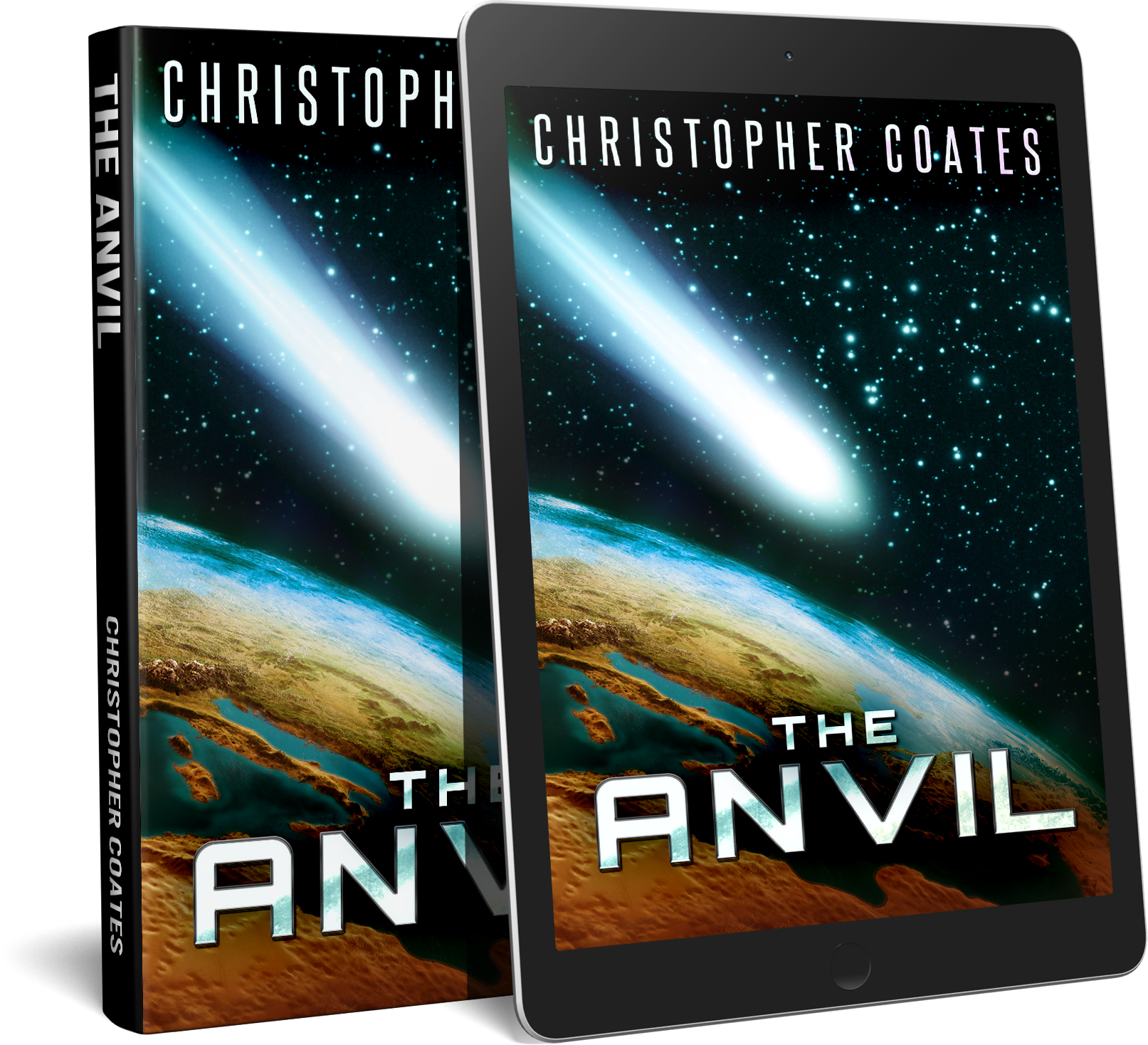The Anvil
“I love a good apocalypse story... This book sits at the top of my list”
“Believable characters, well developed... A very well written book”
“What an amazing story”
Book summary
THE ANVIL by Christopher Coates presents a gripping post-apocalyptic scenario where Earth faces deadly radiation from a comet. The U.S. Government builds underground shelters, designed for a 20-year habitation to protect survivors. As a parallel story to 'The Ark', this sci-fi tale combines elements of survival, courage, and the human spirit's resilience in the face of a drastically altered future.
Excerpt from The Anvil
Chapter 1
President Daniel Anson stood looking out the bulletproof windows of the Oval Office. The world was on the brink of destruction, and here he stood. Daniel was the most powerful political leader in the world, and he was helpless to do anything. Worse yet, to avoid panic, he had to keep this tragic news hidden from the people he swore to serve. He'd never felt more alone and ineffective.
He'd first learned about the impending disaster about a year ago when he was only a few weeks into his second term. He was thankful for that. Trying to manage this situation was bad enough, but trying to run his re-election campaign at the same time would've been unthinkable.
This morning, the President had asked to be left alone until his visitors were all assembled for the 9:00 AM meeting. That had given him almost ten full minutes of quiet time to contemplate the situation and the decisions he would make in the coming months.
The phone on his desk buzzed, and a voice said, "Mr. President. General Draper and his party are here."
"Thanks Liz. Send them in."
A secret service agent opened the door, glanced around the room, and then allowed the trio to enter. The first into the room was General Draper. He was the acting Chairman of the Joint Chiefs. The sixty-three-year-old General stood six-foot-four and was relatively thin. His receding hairline left a large scar visible on his forehead.
Following the General was the National Security Advisor. Jeremiah Baker was a sixty-year-old African American man and a former senator from Virginia. He had extensive experience in areas of national defense and politics. He'd spent twenty years as an officer in the Marine Corps and later another eight years in the Senate, part of that time as the Chairman of the Senate Armed Services Committee.
The final person to arrive was Dennis Roberts. Dennis was the Deputy Director of Homeland Security. Dennis was also former military, having spent eight years in army intelligence before transferring to the Central Intelligence Agency. While at The Agency, he'd served for over a dozen years and distinguished himself on several occasions. He'd come to Homeland Security strictly to deal with the current crisis.
"Gentlemen. Please come in and take a seat. Where's General Fitch?" the President asked.
"General Fitch is busy, sir, and since this meeting is of limited scope, I instructed him to continue his work," General Draper explained.
The President nodded as the men came in and took seats across from the large desk. He too sat before continuing, "Dennis, good to see you again. I know when we first met a couple of months ago; we dropped a bombshell on you and gave you a difficult assignment. As you know, General Draper, Mr. Baker, and I meet weekly on this project. And they've been keeping me up to date on your progress. However, I wanted to have the four of us get together to hear where things stand with your branch of this effort and share any ideas that we may have."
"I understand, Mr. President. Now that I've had some time to get a grasp on what's going on, I think it's safe to say that we'll have about 150 underground shelters available in time. We're working on two hundred locations but don't think we'll have time to get them all completed. The sites are mostly natural caverns or abandoned mines. All places where there's a year-round clean water supply. That's necessary for human consumption and reactor cooling."
"Dennis, if there's anything any of us can do to move your efforts along and make more shelters available, let us know. Each shelter means around a thousand lives saved and a better chance for the human race to rebuild.
“Now, what about the selection process? Who is going into the mines and caverns, and how are they being selected?"
Nodding, Roberts explained, "Sir, we're calling the selection process Project Anvil. I was amazed to see the detail of the records that Homeland has on US citizens. We started with tax records. That automatically will exclude anyone that doesn't pay taxes. Then we removed anyone with a criminal, drug, or psychiatric history. Since we're only going to save about one out of every 10,000 people, we need to select those that will function well and not cause problems while in an underground shelter for an extended time.
“There's also the problem with medications. While there will be medical services available in every shelter, including a pharmacy, we can't be storing the prescription medication needs of every shelter inhabitant for twenty years. Anyone going to a shelter must not be on any daily medications.
“We are then trying to locate people that reside relatively close to the shelters. When it's time to get to the shelters, there will be a massive logistical effort, and the closer, the better. Next, we're trying to make sure that those we're sheltering have valuable skills. We'll pick the electrician or trauma surgeon over the window-washer or birthday-party clown."
There was a brief chuckle at the last remark before he continued. "We also want families. It'll do us no good if most of the inhabitants are past their prime when the shelters open in twenty years. We're also trying to include a diverse range of ethnic backgrounds."
"Why ‘Anvil’? Does it stand for something?" the President asked.
"Sir, as you know, an anvil was used by blacksmiths to take raw iron and pound and form it into something useful. We are using this project to take the people we gather and form them into a new society once the radiation is gone," Roberts explained.
"Okay, I like that. Now, how will it work when it is time to go to the shelters?"
"Everyone who signs on for this is thinking that nothing will ever happen. The idea is that in the event of a nuclear war, pandemic, or other devastating events, we'd bring them into the shelters. We won't inform them that we already know the nature of the disaster and the date this will all go down. They'll get the packing requirements and a limit of how much they can bring, and then go about their lives. Hopefully, they won't think much about being in Project Anvil, but they will know that it is real and urgent if they get the call.
“Forty-eight hours before the event, we'll collect them and transport them to the shelters. It's looking like there will be some people that we'll go out and gather from their homes. Others will get a text message, instructing them to meet at a specific location. We are still working out the logistics. We've already interviewed and signed on about forty percent of the shelter inhabitants."
Pointing at the other two men in the room, the President said, "If there's anything you need, contact them immediately. I don't want anything to slow your efforts."
The four men continued discussing details for several minutes before the meeting finally ended.
Chapter 2
2 years later
Gasping for air, seventeen-year-old Lucy Wilson struggled to breathe as she ran. She could hear footsteps behind her, revealing that her pursuer was close, very close. Pushing herself even harder, she felt her speed increase slightly. The sweat was running down her face as she ran and it was stinging her eyes, but she couldn't wipe it away. She'd been running for almost two miles; her legs were burning, and she knew she was almost at her limit. Rounding the curve, Lucy saw her goal.
Seconds later, she crossed the line, followed immediately by her rival and friend McKenzie Reynolds. The 3200-meter run was the event they both enjoyed and only once had McKenzie won. It was usually close, but Lucy was always a little faster, even though she was a year younger.
The two of them had run against each other for three years. Their natural competitiveness made them work harder, and the two girls were better runners because of it. Even during today's practice run, they had both put in maximum effort, their drive to win not allowing them to hold back.
It was a hot, sunny May afternoon. The temperatures were in the mid-80s, and the heat added another challenge for the girls. They both collapsed on the freshly mowed grass and lay panting for several minutes.
After resting, the two friends went to the bleachers and retrieved small towels and water bottles from their bags. They drank most of their water and then turned to walk across the grass while waiting for their heart rates to return to normal.
"Our times were good. I think we'll do great next week," McKenzie stated.
Wiping the towel across her sweat-soaked face, Lucy replied, "Yeah, I think so too. We did really well, considering how hot it is." So far this year, Lucy was averaging a full minute faster than she had last year when she was a sophomore.
The girls discussed their upcoming track meet against the Upton Beagles. It would be the final meet of the season and their last race together since McKenzie would be graduating in a few weeks.
Their coach had told the girls that after this run, they'd be done for the day. After 10 minutes of cooling down and chatting, Lucy, while tired and sweat-soaked, walked away from the Armstrong Central High School track. She grabbed her bulging backpack from the base of the home bleachers and pulled out a second water bottle from a side pocket, sticking the first, now empty one, inside. Turning, the student athlete headed to the parking lot to find her car. Normally, she'd have taken the time to shower at the school before heading home, but things were different this week.
Early this morning, her parents had flown to Miami for a seven-day cruise to the Caribbean, leaving Lucy in charge of her twelve-year-old brother, Sam. Neither of the kids could understand why their parents had picked this time of year to head south when it was already so hot here.
This was the first time her parents had left them alone for this long, and Lucy was determined to make sure they didn't regret their decision. While she and Sam got along most of the time, being responsible for him was a challenge. They both had busy schedules, and Lucy had to figure out how to make it all work.
Since Sam was only in the sixth grade, he was in a different school building located several miles away. Today, he had a baseball game after school and he'd asked Lucy to try to get there for some of it. She wasn't too concerned if she got to see any of the game, but she didn't want him stuck, waiting for her to pick him up.
Several years before, Sam was critically injured when he'd run into the street and was struck by a car. Lucy had tried to stop him but had been unable. For almost a week, it was uncertain if the boy would survive. During that time, Lucy had refused to leave his bedside. Terrified something would happen to her brother. Three weeks later, when he finally came home, she watched over him constantly. She even took responsibility for helping him several times a day with the exercises he had to do as part of his rehabilitation. Through that horrible experience, Lucy had become very protective of Sam, and the two had grown extremely close.
As she crossed the mostly empty parking lot, she started to smile. Standing by her car was Marcus Ditmore. Unconsciously, her pace quickened. Marcus stood just under six feet tall and had jet-black hair. He had a positive attitude about almost everything and people were naturally drawn to him.
Lucy and Marcus had been best friends since the first grade. Since children, they had held a deep trust in each other and had always confided their secrets. Their connection was deeply rooted and seemed unbreakable. It had taken until this school year for that relationship to transform and for them to start dating. This relationship didn't surprise anyone. Most everyone had already thought they were a couple, and the rest wondered what had taken so long.
Three weeks earlier had been their prom and, since that night, they'd been making plans to look for colleges they could attend together.
Every time she saw Marcus, her hand instinctively touched the bracelet on her wrist. It was a sturdy gold chain with a flat surface that had Marcus' name engraved on it. He wore an identical but larger version of the bracelet with Lucy's name. Neither of them ever took them off.
"Hey, Lucy," he said as he went to give her a hug.
"Don't. I'm all sweaty and gross. I'm late to get to Sam’s game and didn't have time to shower," she explained.
They kissed briefly, then he said, "My baseball practice just ended and I need to get to work, but I saw your car and wanted to say hi."
Lucy nodded. "Can you call me tonight?"
"Probably not. We won't be getting done until quite late, but I'll see you in class tomorrow."
"Okay. My parents are gone all week, but I should be available most days after practice."
"We’ll figure something out,” he promised. He kissed her again and headed for his car.
Getting in her four-year-old Chevy, she started the engine, cranked the air conditioner to maximum as she pulled out of the lot, and headed south toward Armstrong Middle School.
Navigating to the rear of the school, she looked for a spot close to the ballfield and found one easily. The attendance to watch the game was dismal for both teams. As she walked toward the home bleachers, she heard the crack of a bat making solid contact with the ball and saw the centerfielder for Armstrong take two steps back before reaching up with his glove and catching the flyball.
There was an eruption of cheers from the home team and its fans as the game ended. Lucy moved closer to the fence, hoping that Sam would see that she was there before the game ended. She glanced at the scoreboard and saw that the final score was 8-4.
As he was coming in from his position as the shortstop, Sam glanced up and saw his sister. His face, which was already excited from the victory, brightened a little more.
She waited a few minutes while the teams congratulated each other and then met with their coaches for a post-game discussion. When his coach dismissed Sam, he ran to his sister. Before he could speak, Lucy said, “Congratulations. You guys did a great job.” She hoped he wouldn’t ask how much of the game she’d seen.
“Thanks. We were expecting it to be tough, but it went real good.”
“I remember you saying that this morning. Your team is doing great so far.”
As they spoke, they headed back to the parking lot.
“I’m hungry. Can we stop and get pizza?” the young ballplayer asked.
“Sorry, not today. Mom left some chicken defrosting in the fridge, and she wants me to use it tonight.”
Noticing the disappointed look on her brother’s face, Lucy added, “We’ll get pizza one day this week. I promise.”
When Lucy made that promise, she never imagined that it would be impossible to keep it.




















Praesent id libero id metus varius consectetur ac eget diam. Nulla felis nunc, consequat laoreet lacus id.